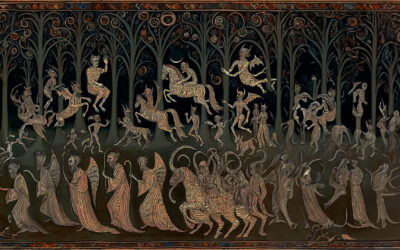Contents
Introduction
Just like every other people in history, the Romans liked to be entertained occasionally. They enjoyed an exciting horse race, a nice play at the theatre and a really good fight. Preferable by well-trained men in large arenas with a sprinkle of lions, tigers, and the occasional elephant.
Gladiators And Animals
These fights, well, these gladiator games, were one of the Romans favorite pastimes.
The games that entertained Romans for centuries were brutal, bloody, and very well organized. They developed over the centuries, and at their peak, they were extremely extravagant and usually combined pure gladiator battles with wild animals or something else that was spectacular, like a naval battle in the middle of the arena.
Julius Caesar, for instance, threw a game using 320 gladiator pairs – that is 640 fighting gladiators! (Plut. Caes. 5.9) Now, the games were not only entertainment; they were a display of power, of politics, and of appealing to the public. And the public loved them.
Or did they? All of them?
Writing Letters
Most known as one of history’s best rhetoricians and a Roman senator, Marcus Tullius Cicero was an ardent letter writer. Many of these have survived the ravenous teeth of time. Cicero wrote to many different people public and private, from his wife and daughter to Pompey Magnus and Julius Caesar.
It is important to understand that the letters we have from Cicero, though private, intimate, and, at times, very personal, were published in his own time. Some letters are written just at the spur of a moment, perhaps with no thought of publication, whereas other letters are extremely thought through, discussing, for instance, politics, and meant to be published. But since they all were published, it is also important to remember that they were edited and that we do not possess the entirety of Cicero’s letter collection. We have 37 books of Cicero’s letters, though at least 35 more books were published in antiquity.
It might seem strange to write letters to friends, family, acquaintances, political allies, but not write for their eyes only, but keep the letters and publish them for everyone to read. However, letter writing, or Epistolary, was/is a literary genre. Nowadays, authors use letters as a way to add realism to their work. Originally, however, the letters themselves were the work, and publishing your letters if you were good with a pen was nothing strange to the Romans.
But what does all this have to do with gladiators spilling their own blood and other’s in the arena?
Cicero’s Thoughts On Gladiator Games
Well, in October 55 B.C. Cicero wrote to his friend M. Marius from Rome. Marius was stuck in his villa at Cumae, looking out on the bay of Stabiae (close to modern Naples) as he was suffering from gout. Marius, therefore, missed the games held at Rome at the time. Pompey Magnus threw the games in honor of the dedication of his theatre and the temple of Venus Victrix. The theatre was situated on the Campus Martius and was the first permanent theatre in Rome and held 40.000 people. The grand and lavish opening went on for days, and Cicero, well, he was an opinionated man. He shared his views on the games in a letter to his gout-suffering friend Marius.
It is this letter that we will read in today’s book club. You will find the Latin text below, along with an English translation.
If you want to learn more about Cicero and his works, check out Chapter 5 of our digital anthology 2000 Years of Latin prose.
Video in Latin
Latin audio
Listen to the audio only, here or in your favourite podcast app:
Latin Text (Ad fam. VII.1)
M. CICERŌ S. D. M. MARIŌ.
Sī tē dolor aliquī corporis aut īnfirmitās valētūdinis tuae tenuit, quō minus ad lūdōs venīrēs, fortūnae magis tribuō quam sapientiae tuae; sīn haec, quae cēterī mīrantur, contemnenda dūxistī et, cum per valētūdinem possēs, venīre tamen nōluistī, utrumque laetor, et sine dolōre corporis tē fuisse et animō valuisse, cum ea, quae sine causā mīrantur aliī, neglēxeris, modo ut tibi cōnstiterit frūctus ōtiī tuī, quō quidem tibi perfruī mīrificē licuit, cum essēs in istā amoenitāte paene sōlus relictus.
Neque tamen dubitō, quīn tū in illō cubiculō tuō, ex quō tibi Stabiānum perforāstī et patefēcistī Mīsēnum, per eōs diēs mātūtīna tempora lēctiunculīs cōnsūmpseris, cum illī intereā, quī tē istīc relīquērunt, spectārent commūnēs mīmōs sēmisomnī. Reliquās vērō partēs diēī tū cōnsūmēbās iīs dēlectātiōnibus, quās tibi ipse ad arbitrium tuum comparārās, nōbīs autem erant ea perpetienda, quae Sp. Maecius probāvisset.
Omnīnō, sī quaeris, lūdī apparātissimī, sed nōn tuī stomachī; coniectūram enim faciō dē meō; nam prīmum honōris causā in scēnam redierant iī, quōs ego honōris causā dē scaenā dēcessisse arbitrābar; dēliciae vērō tuae, noster Aesōpus, eiusmodī fuit, ut eī dēsinere per omnēs hominēs licēret: is iūrāre cum coepisset, vōx eum dēfēcit in illō locō: “sī sciēns fallō.” Quid tibi ego alia nārrem? nōstī enim reliquōs lūdōs, quī nē id quidem lepōris habuērunt, quod solent mediocrēs lūdī; apparātus enim spectātiō tollēbat omnem hilaritātem, quō quidem apparātū nōn dubitō quīn animō aequissimō carueris; quid enim dēlectātiōnis habent sexcentī mūlī in Clytaemnēstrā aut in Equō Troiānō crēterrārum tria mīlia aut armātūrā variā peditātus et equitātus in aliquā pugnā? quae populārem admīrātiōnem habuērunt, dēlectātiōnem tibi nūllam attulissent.
Quod sī tū per eōs diēs operam dedistī Prōtogenī tuō, dummodo is tibi quidvīs potius quam ōrātiōnēs meās lēgerit, nē tū haud paullō plūs quam quisquam nostrum dēlectātiōnis habuistī; nōn enim tē putō Graecōs aut Oscōs lūdōs dēsīderāsse, praesertim cum Oscōs vel in senātū vestrō spectāre possīs, Graecōs ita nōn amēs, ut nē ad vīllam quidem tuam viā Graecā īre soleās. Nam quid ego tē āthlētās putem dēsīderāre, quī gladiātōrēs contempseris? in quibus ipse Pompēius cōnfitētur sē et operam et oleum perdidisse. Reliquae sunt vēnātiōnēs bīnae per diēs quīnque, magnificae—nēmō negat—, sed quae potest hominī esse polītō dēlectātiō, cum aut homō imbēcillus ā valentissimā bēstiā laniātur aut praeclāra bēstia vēnābulō trānsverberātur? quae tamen, sī videnda sunt, saepe vīdistī, neque nōs, quī haec spectāvimus, quidquam novī vīdimus.
Extrēmus elephantōrum diēs fuit: in quō admīrātiō magna vulgī atque turbae, dēlectātiō nūlla exstitit; quīn etiam misericordia quaedam cōnsecūta est atque opīniō eiusmodī, esse quandam illī bēluae cum genere hūmānō societātem.
Hīs ego tamen diēbus, nē forte videar tibi nōn modo beātus, sed liber omnīnō fuisse, dīrūpī mē paene in iūdiciō Gallī Canīniī, familiāris tuī. Quod sī tam facilem populum habērem, quam Aesōpus habuit, libenter mehercule artem dēsinerem tēcumque et cum similibus nostrī vīverem; nam mē cum anteā taedēbat, cum et aetās et ambitiō mē hortābātur et licēbat dēnique, quem nōlēbam, nōn dēfendere, tum vērō hōc tempore vīta nūlla est; neque enim frūctum ūllum labōris exspectō et cōgor nōnnumquam hominēs nōn optimē dē mē meritōs rogātū eōrum, quī bene meritī sunt, dēfendere.
Itaque quaerō causās omnēs aliquandō vīvendī arbitrātū meō tēque et istam ratiōnem ōtiī tuī et laudō vehementer et probō, quodque nōs minus intervīsis, hōc ferō animō aequiōre, quod, sī Rōmae essēs, tamen neque nōs lepōre tuō neque tē—sī quī est in mē—meō fruī licēret propter molestissimās occupātiōnēs meās; quibus sī mē relaxārō—nam, ut plānē exsolvam, nōn postulō—, tē ipsum, quī multōs annōs nihil aliud commentāris, docēbō profectō, quid sit hūmāniter vīvere.
Tū modo istam imbēcillitātem valētūdinis tuae sustentā et tuēre, ut facis, ut nostrās vīllās obīre et mēcum simul lectīculā concursāre possīs. Haec ad tē plūribus verbīs scrīpsī, quam soleō, nōn ōtiī abundantiā, sed amōris ergā tē, quod mē quādam epistulā subinvītārās, sī memoriā tenēs, ut ad tē aliquid eiusmodī scrīberem, quō minus tē praetermīsisse lūdōs poenitēret: quod sī assecūtus sum, gaudeō; sīn minus, hōc mē tamen cōnsōlor, quod posthāc ad lūdōs veniēs nōsque vīsēs neque in epistulīs relinquēs meīs spem aliquam dēlectātiōnis tuae.Join our Newsletter because we send out tips, updates and learning material.
English translation
TO M. MARIUS
If some bodily pain or weakness of health has prevented your coming to the games, I put it down to fortune rather than your own wisdom: but if you have made up your mind that these things which the rest of the world admires are only worthy of contempt, and, though your health would have allowed of it, you yet were unwilling to come, then I rejoice at both facts—that you were free from bodily pain, and that you had the sound sense to disdain what others causelessly admire. Only I hope that some fruit of your leisure may be forthcoming, a leisure, indeed, which you had a splendid opportunity of enjoying to the full, seeing that you were left almost alone in your lovely country. For I doubt not that in that study of yours, from which you have opened a window into the Stabian waters of the bay, and obtained a view of Misenum, you have spent the morning hours of those days in light reading, while those who left you there were watching the ordinary farces half asleep. The remaining parts of the day, too, you spent in the pleasures which you had yourself arranged to suit your own taste, while we had to endure whatever had met with the approval of Spurius Maecius.
On the whole, if you care to know, the games were most splendid, but not to your taste. I judge from my own. For, to begin with, as a special honour to the occasion, those actors had come back to the stage who, I thought, had left it for their own. Indeed, your favourite, my friend Aesop, was in such a state that no one could say a word against his retiring from the profession. On beginning to recite the oath his voice failed him at the words “If I knowingly deceive.” Why should I go on with the story? You know all about the rest of the games, which hadn’t even that amount of charm which games on a moderate scale generally have: for the spectacle was so elaborate as to leave no room for cheerful enjoyment, and I think you need feel no regret at having missed it. For what is the pleasure of a train of six hundred mules in the “Clytemnestra,” or three thousand bowls in the “Trojan Horse,” or variegated armour of infantry and cavalry in some battle? These things roused the admiration of the vulgar; to you they would have brought no delight. But if during those days you listened to your reader Protogenes, so long at least as he read anything rather than my speeches, surely you had far greater pleasure than any one of us. For I don’t suppose you wanted to see Greek or Oscan plays, especially as you can see Oscan farces in your senate-house over there, while you are so far from liking Greeks, that you generally won’t even go along the Greek road to your villa. Why, again, should I suppose you to care about missing the athletes, since you disdained the gladiators? In which even Pompey himself confesses that he lost his trouble and his pains. There remain the two wild-beast hunts, lasting five days, magnificent—nobody denies it—and yet, what pleasure can it be to a man of refinement, when either a weak man is torn by an extremely powerful animal, or a splendid animal is transfixed by a hunting spear? Things which, after all, if worth seeing, you have often seen before; nor did I, who was present at the games, see anything the least new.
The last day was that of the elephants, on which there was a great deal of astonishment on the part of the vulgar crowd, but no pleasure whatever. Nay, there was even a certain feeling of compassion aroused by it, and a kind of belief created that that animal has something in common with mankind. However, for my part, during this day, while the theatrical exhibitions were on, lest by chance you should think me too blessed, I almost split my lungs in defending your friend Caninius Gallus. But if the people were as indulgent to me as they were to Aesop, I would, by heaven, have been glad to abandon my profession and live with you and others like us. The fact is I was tired of it before, even when both age and ambition stirred me on, and when I could also decline any defence that I didn’t like; but now, with things in the state that they are, there is no life worth having. For, on the one hand, I expect no profit of my labour; and, on the other, I am sometimes forced to defend men who have been no friends to me, at the request of those to whom I am under obligations. Accordingly, I am on the look-out for every excuse for at last managing my life according to my own taste, and I loudly applaud and vehemently approve both you and your retired plan of life: and as to your infrequent appearances among us, I am the more resigned to that because, were you in Rome, I should be prevented from enjoying the charm of your society, and so would you of mine, if I have any, by the overpowering nature of my engagements; from which, if I get any relief—for entire release I don’t expect—I will give even you, who have been studying nothing else for many years, some hints as to what it is to live a life of cultivated enjoyment. Only be careful to nurse your weak health and to continue your present care of it, so that you may be able to visit my country houses and make excursions with me in my letter. I have written you a longer letter than usual, from superabundance, not of leisure, but of affection, because, if you remember, you asked me in one of your letters to write you something to prevent you feeling sorry at having missed the games. And if I have succeeded in that, I am glad: if not, I yet console myself with this reflexion, that in future you will both come to the games and come to see me, and will not leave your hope of enjoyment dependent on my letters.
Translated by Evelyn S. Shuckburgh (1908).
















